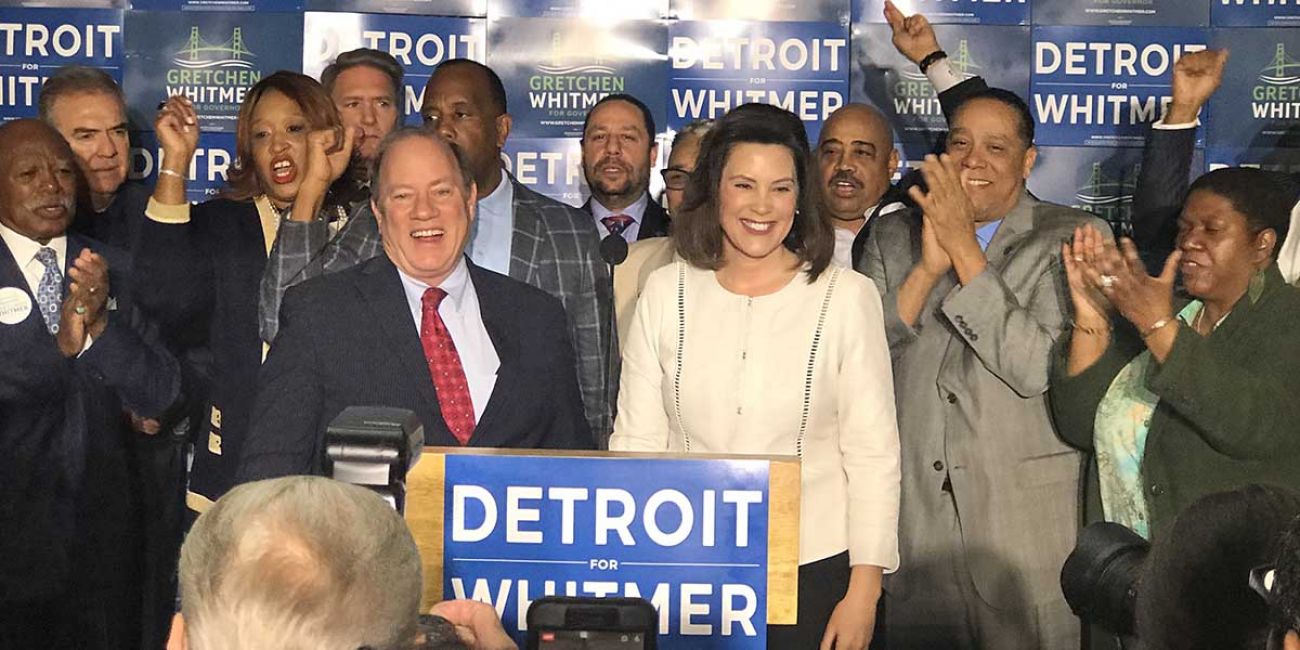Detroit Mayor Mike Duggan flexes clout, mostly scores with Dem wins

Detroit Mayor Mike Duggan played kingmaker Tuesday, introducing Democratic gubernatorial nominee Gretchen Whitmer at her victory party some seven months after trying to woo another candidate in the race.
Duggan staked his political capital on getting strongly and publicly behind Whitmer and several other Democrats, particularly opponents of lawmakers who helped defeat the mayor’s proposed overhaul of auto insurance.
The scorecard is mostly positive for Duggan, with caveats:
- Whitmer won the primary in a rout statewide, but lost the city of Detroit to millionaire and fellow Democrat Shri Thanedar.
- Detroit City Council President Brenda Jones, a Duggan ally, lost narrowly the 13th Congressional District to former state lawmaker Rashida Tlaib in the primary race.
- Former Duggan aide Fayrouz Saad lost big in the 11th Congressional District to Haley Stevens.
- Duggan-endorsed candidates in the state House and Senate won seven races and lost four (although some were still close Wednesday, and results remain unofficial).
“There were some ups and downs, but overall it was a victory for him. In the big names and big races, Duggan’s slate won,” said Al Williams, a political consultant and former membership director of the state Democratic Party.
“You can say he went 7 and 4, but he won the races he really targeted. It was a big night for him.”
Republican pollster Steve Mitchell agreed, noting the mixed won-loss record doesn’t reflect the strength of Duggan’s influence.
“We don’t know what the margins would’ve been had the Duggan machine not gotten involved in the governor’s race or some of these other campaigns,” Mitchell said.
“It’s easy to look at the marquee races and say the mayor had problems. Just looking at it from my perspective, I think he had a good” result.
Playing hardball in the legislature
In state races, Duggan played hardball against lawmakers who helped defeat auto insurance reform in 2017, backing opponents of state Rep. Fred Durhal II of Detroit, who lost to Marshall Bullock, a former neighborhood manager for Duggan; and former Rep. Brian Banks, who lost a bid for Senate against Duggan-backed Adam Hollier.
Duggan-backed state legislature candidates also benefited from billboards throughout southeast Michigan bemoaning high car insurance and saying, “We Need Adam Hollier in Lansing,” “We Need Marshall Bullock in Lansing” and the like.
The nonprofit behind the ads, Detroiters for Change, is not disclosing where it gets its money, and the state Bureau of Elections is investigating whether the nonprofit broke campaign finance laws by advocating for specific candidates, the Metro Times reported last week.
The nonprofit also paid for negative ads targeting Durhal and Banks, said Williams, an aide to Durhal.
Duggan had some big misses as well: His former campaign manager Rico Razo lost in a state House race to Isaac Robinson.
“The question is, does the mayor have any coat tails? He got some energetic people elected, (but) if he had coat tails he would’ve delivered Detroit for Whitmer and he couldn’t,” said Steve Hood, a political consultant and Detroit media personality.
At the top of the ticket, Duggan once was so concerned about Whitmer’s electability that he led an effort with union leaders to recruit another candidate, such as U.S. Sen. Gary Peters, into the race, as Bridge Magazine first reported.
But Duggan endorsed Whitmer in February, and has since led her on several neighborhood tours and a get-out-the-vote party last weekend.
The fact that Whitmer – who lives in East Lansing – had her victory party in Detroit, with Duggan on stage, is testament to his clout, Williams said.
Mitchell said Whitmer faced significant disadvantages in Detroit because she is white and viewed as an establishment candidate. Even so, she only lost by a few thousand votes.
Duggan also wasn’t able to help Jones win in a crowded field to succeed U.S. Rep. John Conyers Jr.
Carl Ramsey, who lost to Tlaib in a state House race in 2008, said it shows Duggan’s influence is no match for big money. Tlaib raised significantly more money than the other five candidates in the race.
“Machine politics is completely dead in the city of Detroit,” said Ramsey, 48.
“(Jones) had the mayor, labor unions, and most of the ministers’ support and she couldn’t pull it off. That opens the door for any candidate that can out-fundraise their opponent.”
The race has no Republican candidates, so Tlaib is slated to become the first Muslim woman elected to Congress. A significant portion of her fundraising came from national donors excited by that prospect, Mitchell said.
Other African American candidates in the race also siphoned votes from Jones, Mitchell said.
“The fact is (Duggan) chose to get involved in tough races to see if he could make a difference. I suspect he made a difference,” Mitchell said. “He just couldn’t pull them over the finish line.”
See what new members are saying about why they donated to Bridge Michigan:
- “In order for this information to be accurate and unbiased it must be underwritten by its readers, not by special interests.” - Larry S.
- “Not many other media sources report on the topics Bridge does.” - Susan B.
- “Your journalism is outstanding and rare these days.” - Mark S.
If you want to ensure the future of nonpartisan, nonprofit Michigan journalism, please become a member today. You, too, will be asked why you donated and maybe we'll feature your quote next time!

